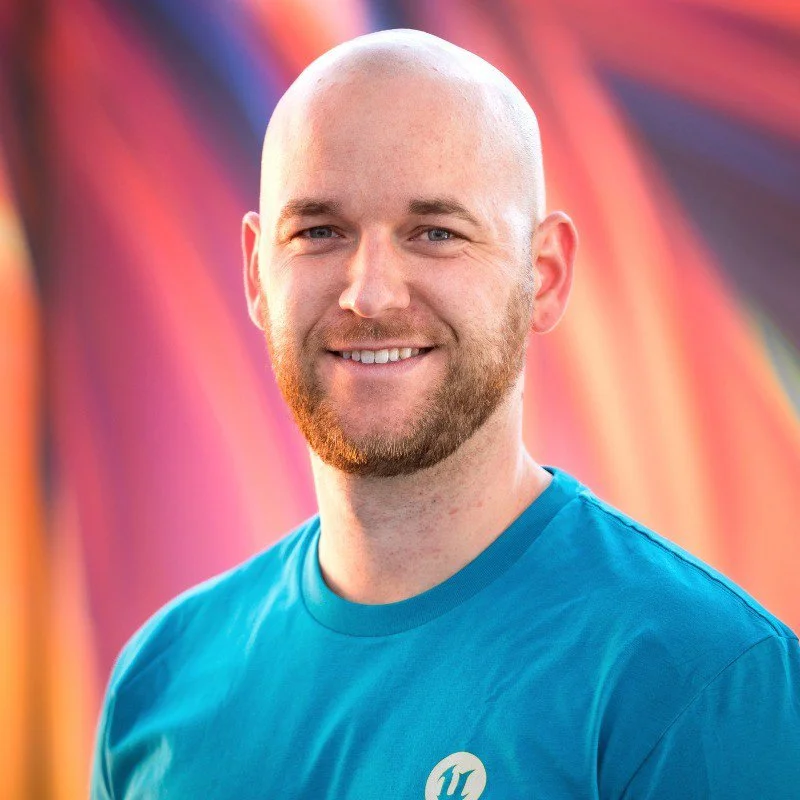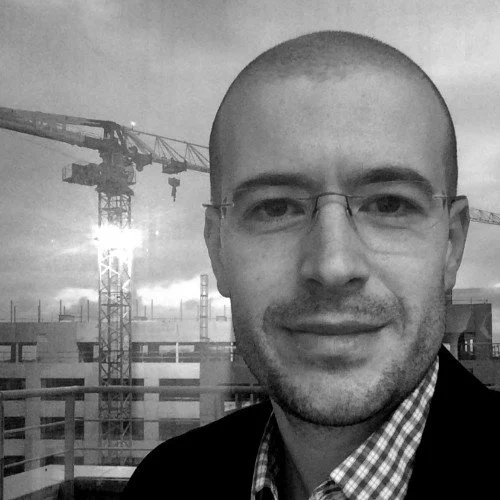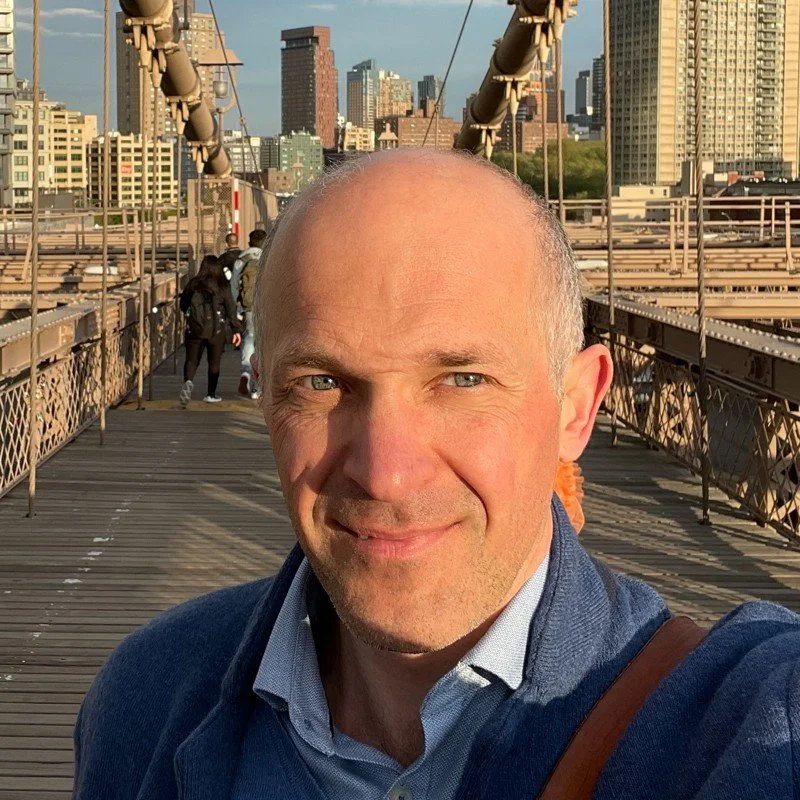IN PERSON Workshops
Thursday, November 13th | @ verizon education center / cornell tech | IN PERSON
Join your peers for a full day of Workshops hosted by design innovators and software pioneers developed to introduce participants to a wide range of powerful new workflows that enable new ways of working and enhance existing design processes.
Location
All In Person Workshops are hosted at:
Verizon Education Center
Cornell Tech
2 W Loop Rd, New York, NY 10044
Transit Options
Roosevelt Island Tramway to / from Manhattan
Subway via the F Train at the Roosevelt Island Station
NYC Ferry via the Astoria Route at the Roosevelt Island Stop
Agenda
9:30 am
10:00 am - 1:00 pm
1:00 pm - 2:00 pm
2:00 pm - 5:00 pm
Registration
Morning Classes
Lunch Break
Afternoon Classes
full day Workshops
Epic Games + Heatherwick studio
Bringing Rhino models to life with Unreal Engine
There are many great tools out there for rendering your parametric designs, but a game engine might just be the most flexible. Working in an interactive real-time renderer allows for a dynamic presentation that supports creative exploration and wows stakeholders. In this full day workshop, attendees will take a Rhino model designed by Heatherwick Studio and turn it into an interactive animated scene using Grasshopper and Unreal Engine.
Topics covered include
Organizing Rhino and Grasshopper for transition and integration into Unreal Engine
Rigging and animating kinematic elements
Setting up time of day lighting
Accurate geographical context with Cesium and Google Earth
Procedural landscaping with PCG
Programming an interactive presentation
-
Rhino 7 or 8 with Grasshopper
Unreal Engine 5.6.1
Bring a laptop that meets Unreal Engine’s minimum specs with a dedicated graphics card.
-
As a Solution Architect at Epic Games, Stephen works with AECO customers globally to implement Epic's ecosystem of real-time tools: Twinmotion, Unreal Engine, and RealityScan. He comes armed with over 10 years of experience supporting end users doing rendering and development for VR, mobile, AR, and desktop applications.
Dassault Systemes + SHoP Architects
Parametric & Generative Design in CATIA on the 3DEXPERIENCE Platform
The focus of this workshop will be to explore parametric, generative design & engineering techniques in a collaborative project environment. We will focus on early concept design and late-stage detailed design methodologies, harnessing the power of automation in CATIA on the 3DEXPERIENCE Platform.
While algorithmic design has become commonplace in most design & engineering practices, manufacturing and assembly of building components remains highly confined to flattened construction documents and contractual 2D representations. In this workshop we will seek to break that paradigm by designing building systems that are constructed by an algorithm, not a drawing.
In order to achieve this, we will focus on deploying a novel approach to the design and engineering of a lattice space frame structure and accompanying façade system. We will work with dedicated CATIA applications that focus on freeform surface and solid modeling, algorithmic/generative modeling of a space frame structure, automated lattice creation, and detailed cladding system design.
Facilitating collaboration, all components of the workshop will be managed on the 3DEXPERIENCE Platform, providing all participants a live view of each other’s progress and the opportunity to collaborate in real-time with each other’s models.
-
Jonathan Asher bridges the architecture, engineering and construction disciplines as an expert in generative parametric modeling, design automation and digital fabrication. An experienced architect, engineer and fabricator, he is responsible for the global sales strategy and direction of CATIA's Architecture, Engineering, Construction, City Planning and Infrastructure solutions for Dassault Systemes' 3DEXPERIENCE Platform.
-
John Cerone is a Principal who leads SHoP’s Virtual Design and Construction teams, including all technology visioning initiatives and the development of bespoke technology tools. John is recognized internationally as a leader in exploring the future uses of technology in design and construction. He currently represents SHoP at the Design Futures Council, as well as leading our work with Dassault Systèmes as part of a transdisciplinary group that includes Boeing and Tesla. His work at SHoP includes a lead role in developing the technologies behind the success of the Barclays Center, the VDC-driven delivery of the Botswana Innovation Hub, and an ongoing technology and exhibitions project at the Intrepid Sea, Air and Space Museum in New York.
KPF
Grasshopper inside AI: Run Grasshopper definitions from AI assistants with MCP and Rhino.Compute
“Hey AI, could you run this Grasshopper definition for me?”
With Rhino.Compute you can run Grasshopper definitions remotely—without ever opening Rhino or Grasshopper. The Model Context Protocol (MCP) enables you to connect AI assistants directly to your custom tools. In this workshop, you’ll learn how to combine both technologies and make them work together.
We’ll start with an introduction to Rhino.Compute, followed by an overview of MCP. Then, we’ll walk through building an MCP server that interacts with Rhino.Compute.
By the end of the session, you’ll be able to run Grasshopper definitions remotely through an AI assistant using Rhino.Compute and MCP.
-
Basic level of programming (we will use Python)
-
Justyna is a senior software developer at KPF Urban Interface, leading in-house software development efforts with a strong focus on Rhino application development and Rhino.Compute. She has a background in architecture and computational design and previously worked as a Computational Design Specialist at Grimshaw. Justyna holds a master’s degree in Architectural Computation from the Bartlett School of Architecture. She is also a teaching faculty at the Institute of Advanced Architecture of Catalonia and has previously taught at the Bartlett School of Architecture, UCL, and the University of Westminster.
-
Aleksandra is the Data & Analytics Lead at KPF, with more than 15 years of experience in large-scale data management, distributed pipelines, and machine learning workloads. She graduated from Uniwersytet Śląski and Politechnika Śląska, co-presented at the NVIDIA GTC conference, and has published at IAAC bits and SimAUD. Her current interests include GenAI and its impact on data management and information retrieval.
morning Workshops
Thornton Tomasetti | CORE studio
Agentic AI and MCP for AEC
2025 is undeniably the year of AI agents! In this workshop, you will learn about Anthropic's Model Context Protocol (MCP), which is quickly becoming an industry standard for connecting Language Models to tools and custom data sources. Together, we will build a series of MCP servers that extend the functionality of Claude Desktop by enabling it to perform actions on your computer and call third-party APIs. We will then build a custom AI Agent that can use our MCPs to reason through problems and even interact with design software. This workshop will give you a solid foundation for automating parts of your daily workflow with MCPs and agentic AI systems.
-
Sergey Pigach is a Senior Associate Applications Engineer at CORE studio | Thornton Tomasetti. Sergey's work builds on his architectural training by bridging the domains of technology and design, driving him to develop computational tools for architects, designers, and engineers. Since joining CORE studio he has worked on desktop and web-based projects including Swarm, a cloud compute solution for Grasshopper; ShapeDiver, a desktop client integration following a merger; and—most recently—Cortex, CORE Studio's new MLOps platform.
Foster + Partners
Cyclops : Real-Time GPU-based Environmental Simulation
Learn GPU-accelerated techniques for near–real-time analysis of solar obstruction, daylight autonomy, and cumulative radiation at façade, building, and urban-context scales.
Advancements in GPU-accelerated ray tracing have transformed our ability to conduct city-scale environmental analyses in near real time. This hands-on workshop presents reproducible workflows for GPU-based evaluation of solar obstruction, daylight autonomy, and cumulative radiation at three hierarchical levels of the built environment—façades, individual buildings, and urban contexts.
The workshop is structured into two modules:
Foundations of Environmental Analysis, illustrated with industry case studies
Analysis Methodologies for near real-time, Performance-Driven Design.
By the end of the workshop, attendees will be equipped with scalable workflows for rapid environmental assessment, ready to integrate into architectural, urban, or research projects.
-
Cyclops is an environmental analysis plugin for Grasshopper in Rhino 3D developed by Foster + Partners. It significantly accelerates raytracing-based simulations by leveraging state-of-the-art GPU computing.
Cyclops is compatible with Rhino 7 and 8 on Windows.
It requires an NVIDIA GPU of compute capability 5.0 (Maxwell) or higher. This means most modern NVIDIA GPUs will work, for a complete list of supported GPUs see the NVIDIA CUDA GPUs page.
Cyclops also requires an NVIDIA driver of version 536.25 or higher. The driver version can be checked in the NVIDIA Control Panel and updates can be downloaded from the NVIDIA website.
-
Oscar is part of the Applied Research + Development team at Foster + Partners, where he develops computational tools that underpin performance-driven design workflows. His work includes solutions for view analysis, environmental simulations, rendering, and artificial lighting.
With a degree in Architecture and Engineering from Chalmers University of Technology, Gothenburg, Sweden, Oscar has contributed to advancing the AEC industry in areas like geometry processing, digital fabrication, optimization, and software interoperability.
Kudu
Parametrically Driven ETABS, SAP2000 & SAFE
Learn how to interface with ETABS, SAP2000 & SAFE using the CSiAPI with Grasshopper, C#, and Python.
Improve your data processing workflows with modern tools and custom scripting for
Faster geometry creation
Automated property definitions & assignments
Enhanced visualization of analysis & design results
In this workshop, we will
Demystify the CSiAPI, its documentation, and basic setup
Explore automated model creation and visualization of CSi models with the Kudu Grasshopper plugin
Create our own custom CSiAPI components with C# in Grasshopper
Create custom CSiAPI scripts in Python for analysis post-processing, data manipulation, and visualization
-
Rhino (7 OR 8) AND Grasshopper
(ETABSv20/21(NOT 22) OR SAP2000v21/25 OR SAFEv20/21)
Python 3
Prior coding experience not required.
-
Stephen is a structural engineer, computational designer and developer of the Kudu Grasshopper plugin.
McNeel + Proving Ground
Computational Design with Grasshopper 2
Beginner / Intermediate Level Workshop
For over 15 years, Grasshopper has been the essential tool for computational design workflows in architecture and engineering. In recent years, David Rutten from McNeel has been actively developing Grasshopper 2 (G2). Now in the alpha stage of development, users can begin to test and try G2 in Rhino 8 and Rhino 9.
This workshop will introduce computational design workflows with Grasshopper 2. The workshop will benefit experienced computational designers who are interested in getting oriented to G2. The topics will also serve as a general introduction to computational design concepts for new users.
Grasshopper 2 is more than an incremental update to the tools that designers have become familiar with: G2 is a ground-up rebuild and reimagining of the graphical programming language free of the technical debt of its predecessor. While the overall workflow will be very familiar to veterans of Grasshopper, the G2 interface is modernized with new data management concepts and performance enhancements throughout.
The workshop has the following learning objectives:
Learn how to install the Grasshopper2 (G2) alongside Grasshopper 1 (G1).
Learn how to install a third-party plugin (LunchBox G2) to extend G2 functionality.
Get oriented to G2’s UI/UX through hands-on computational design exercises.
Become familiar with G2’s new conventions for component logic and data management.
Learn about options for forward and backwards compatibility between G2 and G1.
-
Rhino 9 WIP (Preferred)
Rhino 8 (Alternative)
Grasshopper 2 alpha, available through the Rhino package manager
LunchBox G2 alpha, available on the McNeel discourse https://discourse.mcneel.com/t/lunchbox-g2-alpha-plugin-thread-for-grasshopper2/205151
Microsoft Excel
-
I am the founder of PROVING GROUND – a new business venture that delivers data-driven solutions for architects, engineers, contractors, and owners. I have worked with some of the most reputable organizations in the building industry to create digital transformation strategies and custom software. My work in data and computation has impacted the design and delivery of a wide range of built environments including offices, stadiums, hospitals, and museums.
Skema + ShapeDiver
From concept to BIM: Part 1
Reusable design intelligence in the cloud with
Grasshopper, ShapeDiver, Skema, and Revit
This two-part workshop shows how firm-specific knowledge captured in Grasshopper and Revit can be reused through a cloud-based workflow. Part 1 covers how to generate custom unitized facades and integrate Skema with ShapeDiver for reusable, firm-specific design logic.
Part 2 demonstrates how those results flow into Revit for high-fidelity BIM deliverables that preserve design intent.
Capture firm-specific rules in Grasshopper and publish them through ShapeDiver.
Integrate Skema with ShapeDiver to automate facade and layout generation.
Generate a unitized facade system from Skema’s wall geometry using Grasshopper.
Manage custom unitized facades across projects with reusable presets.
Use Skema as the mediator for geometry and metadata across platforms.
Sync Skema’s data-rich models into Revit via Rhino.Inside for high-fidelity BIM deliverables.
-
Marty Rozmanith is an entrepreneur and building design/construct professional with a 30+ year career in transforming the building industry. As co-founder and Chief Technology Officer at Skema, Marty leads the team developing the Skema Software Suite, the world’s first BIM Knowledge Reuse Engine.
Marty’s career is a solid mix of technology startups and global software behemoths that give him a unique perspective on the AEC industry. Prior to joining Skema, Marty spent ten years at Dassault Systemes as Global Sales Director and Strategy Director for AEC. Marty is best known for his role leading the requirements team for the Revit product (acquired by Autodesk). His work applying modular approaches and digital twins in AEC has been published in The Wall Street Journal, Forbes magazine and other professional journals. Marty holds a Bachelors of Architectural Engineering (BAE) from The Pennsylvania State University (Penn State) and a Masters in Business Administration (MBA) from Boston University.
-
—-
-
—-
afternoon Workshops
+
McNeel + Proving Ground
Developing Custom Plugins for Grasshopper 2
Beginner / Intermediate Level Workshop
Grasshopper’s success can be attributed to the computational design community’s efforts in developing an extensive ecosystem of custom plugins. This workshop will serve as an orientation for developing and porting custom plugins with Grasshopper 2 using C# and .NET Core workflows.
This workshop is geared toward Grasshopper users, developers, and script builders interested in creating new plugins or porting their existing plugins to Grasshopper 2. To guide the workshop, C# templates and example source code will be provided for building a functional Grasshopper 2 plugin.
The workshop has the following learning objectives:
Learn how to install the Grasshopper2 (G2) and custom plugins.
Learn how to set up a Visual Studio C# project for custom plugin development.
Learn how to port an existing Grasshopper plugin code to a Grasshopper 2 plugin.
Learn about tools for creating beautiful vector-based icons for your G2 plugin.
-
Prior coding/plugin development experience is ideal.
Minimum basic understanding of C#.Rhino 9 WIP (Preferred)
Rhino 8 (Alternative)
Grasshopper 2 alpha, available through the Rhino package manager
Microsoft Visual Studio Community Edition
LunchBox G2 alpha, available on the McNeel discourse https://discourse.mcneel.com/t/lunchbox-g2-alpha-plugin-thread-for-grasshopper2/205151
-
I am the founder of PROVING GROUND – a new business venture that delivers data-driven solutions for architects, engineers, contractors, and owners. I have worked with some of the most reputable organizations in the building industry to create digital transformation strategies and custom software. My work in data and computation has impacted the design and delivery of a wide range of built environments including offices, stadiums, hospitals, and museums.
-
—-
Skema + ShapeDiver
From concept to BIM: Part 2
Reusable design intelligence in the cloud with
Grasshopper, ShapeDiver, Skema, and Revit
This two-part workshop shows how firm-specific knowledge captured in Grasshopper and Revit can be reused through a cloud-based workflow. Part 1 covers how to generate custom unitized facades and integrate Skema with ShapeDiver for reusable, firm-specific design logic.
Part 2 demonstrates how those results flow into Revit for high-fidelity BIM deliverables that preserve design intent.
Capture firm-specific rules in Grasshopper and publish them through ShapeDiver.
Integrate Skema with ShapeDiver to automate facade and layout generation.
Generate a unitized facade system from Skema’s wall geometry using Grasshopper.
Manage custom unitized facades across projects with reusable presets.
Use Skema as the mediator for geometry and metadata across platforms.
Sync Skema’s data-rich models into Revit via Rhino.Inside for high-fidelity BIM deliverables.
-
—-
-
—-
-
—-
-
Marty Rozmanith is an entrepreneur and building design/construct professional with a 30+ year career in transforming the building industry. As co-founder and Chief Technology Officer at Skema, Marty leads the team developing the Skema Software Suite, the world’s first BIM Knowledge Reuse Engine.
Marty’s career is a solid mix of technology startups and global software behemoths that give him a unique perspective on the AEC industry. Prior to joining Skema, Marty spent ten years at Dassault Systemes as Global Sales Director and Strategy Director for AEC. Marty is best known for his role leading the requirements team for the Revit product (acquired by Autodesk). His work applying modular approaches and digital twins in AEC has been published in The Wall Street Journal, Forbes magazine and other professional journals. Marty holds a Bachelors of Architectural Engineering (BAE) from The Pennsylvania State University (Penn State) and a Masters in Business Administration (MBA) from Boston University.
Schmidt Hammer Lassen
Modern UX for AEC Stack: Building Web Interfaces in Revit & Rhino
This hands-on workshop will guide participants through building a modern web-based application on top of an AEC-focused tech stack, integrating with both Revit and Rhino. Over the course of 4 hours, we’ll create a shared web interface loaded inside each host application using WebView2, and connect it to their respective APIs to perform a fun, lighthearted task. The focus will be on showing how a web interface can help deliver delightful, intuitive, and visually polished user experiences, while keeping the architecture clean and maintainable. Attendees can choose to follow along, building only the Revit add-in, only the Rhino plugin, or both if they’re feeling adventurous.
IaaC + Thornton Tomasetti | CORE studio
Exploring Buildings as graphs
Representing buildings as graphs enables efficient analysis of spatial relationships, navigation, and connectivity by abstracting their properties based on their relationships. This approach helps humans and computers understand buildings, enabling tasks like pathfinding, optimization, and simulation. The workshop will focus on the representation and visualization of buildings as graphs while exploring their opportunities. Participants will learn how to convert IFC files to graphs, visualize them in a web application to get insights, and query their properties using LLMs.
-
Basic level of programming in Python or JavaScript
-
David Andrés León is a private consultant for digital technologies for the AEC industry with particular focus on web development and user interfaces for AI. His goal is to empower designers with digital tools to leverage the design process. He is also currently Director of the Master of Advanced Computation for Architecture and Design (MaCAD) at the Institute for Advanced Architecture of Catalunya (IAAC), and a member of the faculty of the Norman Foster Foundation and the Universitat Politècnica de Catalunya (UPC). He has been involved in various research collaborations and co-authored numerous publications in the field of architectural research.
David holds a Master of Science Degree from the Institute for Computational Design and Construction (ICD) in Universitat Stuttgart and a Masters Degree in Advanced Design and Digital Architecture from the Escola Superior de Disseny i Enginyeria de Barcelona (Elisava). He has been involved in several research undertakings of which stand out his participation in German research platform FAT-LAB in Stuttgart and his collaboration as a research assistant in the Centre for Information Technology and Architecture (CITA) for the EU-Horizon 2020 Future and Emerging Technologies Proactive Action project Flora Robotica. David is also the co-author of various publications in the field of architectural research and robotics.
-
Sophie is a senior applications developer at Thornton Tomasetti | CORE Studio where she develops tools to automate engineering and design workflows. With a background in structural and facade engineering, she brings practical expertise to her role.
Karamba3D
Scaling Up Parametric Engineering Workflows with Karamba3D
Karamba3D is a parametric finite element analysis tool embedded in Grasshopper, enabling fast, interactive structural analysis within the Rhino environment. This hands-on workshop will explore how to make these powerful capabilities more accessible to non-expert users, facilitating both the rapid creation of structural models and intuitive interaction with analysis results.
Building on the latest developments at Karamba3D and custom workflows developed by Bollinger+Grohmann, the session will focus on UI/UX strategies and templated model setups designed to lower the entry barrier for architects, engineers, and designers. The goal is to support wider adoption of computational design methods across multidisciplinary teams.
Participants will gain insights into practical tools, templates, and interface techniques that eliminate the need for advanced scripting knowledge. The second half of the workshop will introduce simple interaction methods—such as custom UI elements and keyboard-based input tools within Rhino and Grasshopper—to make result exploration easier and more engaging.
-
Matthew Tam is a computational designer based in Vienna, having studied architecture at the University of Applied Arts Vienna, SCI Arc, and the University of Melbourne. He is the Operations Manager at Karamba3D and regularly holds workshops at conferences and institutions such as DigitalFUTURES, CAADRIA, AAG, Design Modeling Symposium, Smart Geometry, and McNeel. Matthew leads the Design Technology department in Bollinger+Grohmann Vienna, working at the interface of architectural, structural, and computational design.
Thank you to our Partners!
AND THANK YOU TO OUR SPONSORS!
Continue to stay informed by following us on Twitter, Instagram, and checking our website.
Please take a minute to review our values and promise to the community.










































